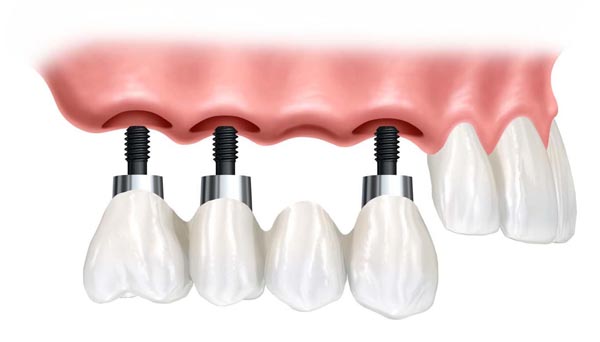What Is Dental Implant Treatment?
Think of dental implants as metal anchors, usually made of titanium, that are surgically placed into the jawbone to hold permanent replacement teeth or dentures. Through a process called "osteointegration", the jawbone actually attaches itself to the implant over time, providing tremendous stability.
Implant treatment is usually performed by a general dentist, oral surgeon, periodontist or a team of these doctors. To devise the best treatment plan for you, we first complete a medical and dental history and a thorough oral examination, including x-rays. The procedure and follow-ups are often performed in the dental office using local anesthetic. Depending upon your individual situation, other types of anesthesia may be used to ensure your comfort.
During surgery, each implant is placed within the jawbone to serve as an anchor for the post that will eventually support the replacement teeth. Generally from three to six months or more is then allowed for the bone tissue to grow around the implants and hold them securely in place.
Immediately after surgery we will give you specific post surgical instructions to assure the best possible healing. In addition, we may prescribe pain medication and in some cases, antibiotics to aid in the healing process and help alleviate any discomfort. At this time, you may be fitted with temporary dentures or natural-looking teeth to help you function as normally as possible. You also will need to limit your diet to soft foods and follow important oral hygiene instructions. Follow-up care is important during this time.
Once the jawbone has firmly healed around the implant, a small post is attached to each implant. The post protrudes through the gum line and serve as an anchor for the replacement teeth. This short procedure usually requires only local anesthesia. After your gums have healed, the replacement teeth or dentures are securely attached to the posts.

Because dental implants are patterned after the structure of your natural teeth, they provide a highly stable support system for the replacement teeth or dentures. Other benefits include:What Are the Benefits of Dental Implants?
Improved biting pressure. Healthy teeth are able to absorb over 500 pounds of biting pressure per square inch. If you've worn dentures for a long time, that pressure may be diminished significantly to one tenth that of natural teeth. Dental implants can often restore the amount of pressure that can be withstood to nearly the same level of healthy natural teeth.
Comfort and fit. Because your replacement teeth are anchored securely to the implants in your jawbone, they can't slip and slide like unsecured dentures can. When dentures aren't secure enough, they often cause sores in the mouth and an annoying clicking sound. Dental implants eliminate these problems.
Longevity and reliability. With proper oral hygiene and care, scientifically tested and approved dental implant systems have been shown to last as long as 20 years or more with few complications.
Increased self confidence. Because dental implants function remarkably like natural teeth, most people who get them experience a renewed sense of self confidence once they realize they can again chew, talk, laugh and smile with confidence.
What Risks Are Involved?
Dental implant surgery has proved to be successful for hundreds of thousands of people over the years. Negative effects such as bleeding, infection, injury to the nerves or sinus cavity, or incomplete healing of the bone around the implant resulting in implant failure are rare. During the healing process however, discomfort, swelling and inflammation of the gums, normal responses to oral surgery, may be present in varying degrees. If you have questions about your individual situation or want to discuss what is considered normal in the healing process, we will be happy to address your concerns.
How Do I Know If I'm a Good Candidate for Dental Implants?
If you face the loss of one or several teeth or if you're dissatisfied with dentures or other options available to you, you may find that dental implants are right for you. Age is not typically a major factor: successful dental implants have been performed on young people as well as the elderly.
During your initial consultation, we'll help you decide. In general, we look for the following characteristics:
general good health
healthy gums
sufficient underlying bone to support the implants
good attitude to ensure that you follow through with vital oral hygiene habits
What Type of Care Is Required for Dental Implants?
The care you give to your dental implant makes a tremendous difference in the overall satisfaction your experience, as well as the longevity of the implant itself. With proper oral hygiene habits brushing, flossing, and regular dental check-ups your implant will serve you well.


